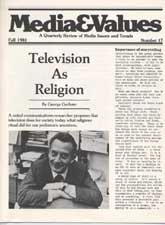Why Don't People in Movies Ever Pray?
|
This article originally appeared in Issue# 17
|
Movies these days reflect almost every aspect of life and death but seldom do they deal with an experience common to millions in every age--religious faith.
Why is it that moviemakers, particularly in America, neglect the dimension of religion in the stories they film? When in a dramatic sequence on the screen did you last see a character really praying? It hardly ever happens.
And yet, people do pray. Most of the people in the United States and Canada believe in God and certainly these believers turn to God in prayer either regularly or occasionally.
Many will honestly and genuinely voice desperate prayers in situations of fear or extremity. But movies censor out this reflection of real life more often than not.
A prominent psychiatrist has said that if you really want to understand the character of people, listen to them pray... In prayer people reveal themselves and manifest the actual values they prize. But movie people don't seem to pray.
Film figures seldom worship. Churches are still attended by millions each week but Hollywood hasn't discovered this phenomenon. Or, if a church service is somehow included in a dramatic story it is more likely than not to be a special occasion like a wedding or a funeral. Or it might be the excuse for a comic interlude. Serious worship doesn't often make it into movie scripts.
American movies more often than not will portray a minister or a priest in a negative way as a stereotype. The clergyman--hardly ever would there be a woman minister depicted--is probably shown as an inept, blundering, prissy, or vain fuddy-duddy. Would the pastor who honestly struggles with the human issues of life find a way into cinema drama today?
The problem starts with the writers. Many scripters seem to have been seduced by secularism to the point of embarrassment at including bona fide religious moments. There must be a lot of self-censorship at this point.
But maybe some writers try to depict spirituality but find that producers and directors cut this material out. I feel there is an insecurity on the part of producers and directors to deal with religion. Maybe they are intimidated by the kind of blasts that emanate from pulpit and pew against excesses of sex and violence.
There hasn't been a positive story on the screen about a Protestant minister since Frederick March starred in One Foot in Heaven in 1941. But several negative portrayals cone to mind like Elmer Gantry and Abner Hale in Hawaii. Gregory Peck played a sympathetic priest in The Keys of the Kingdom in 1944 as did Bing Crosby the following year in The Bells of St. Mary's, but most of the other priestly roles have been about questionable characters, except for Don Murray's The Hoodlum Priest in 1961. But where are the strong people of God on the screen today?
This is no special plea for equal tine as if one could measure the treatment of religion according to titles or feet of film devoted to the subject. Religion similarly suffers in newspapers, magazines and on radio and television, except for the paid commercials that some faith programs propagate. There must be as many persons in churches as on golf courses on Sunday morning, but the media pay more attention to golf than to God.
Perhaps we should not be at all surprised. Real religion is uncomfortable to deal with. Much of it is unreasonable, illogical, inconceivable and mysteriously elusive to those who don't experience it by faith.
And faith is not by definition reasonable. For most writers it is also inexplicable. It takes a special communicative gift to convey the mystic reality of communion between human beings and their God.
But there's a challenge if there ever was one for the producer--to return the missing dimension of religion to movies. We pray they will succeed.



